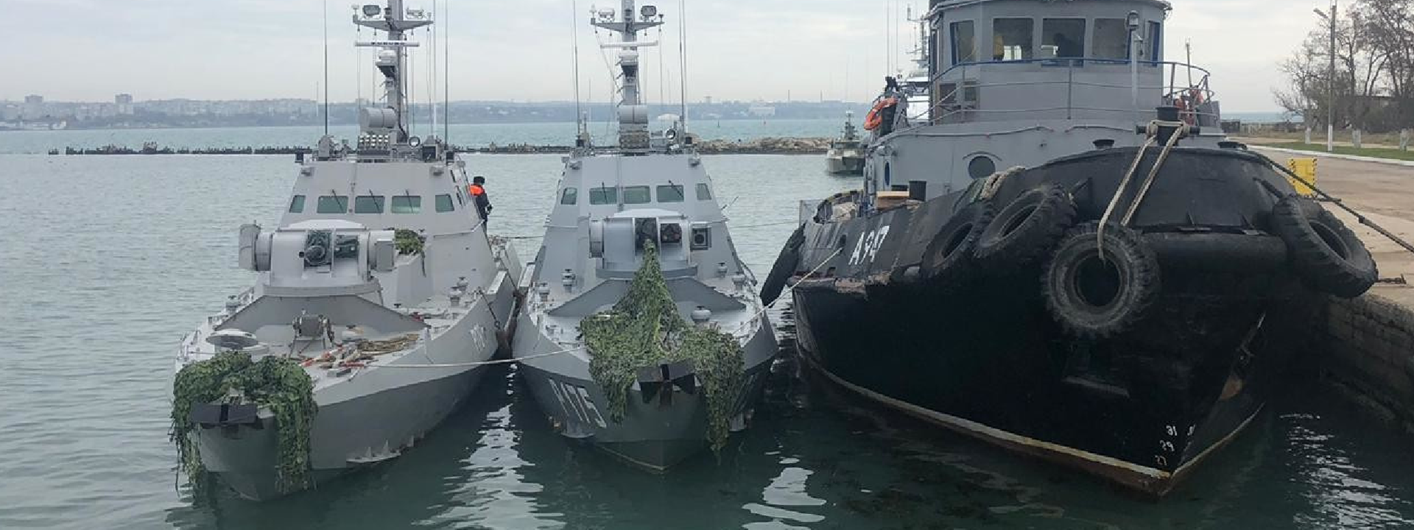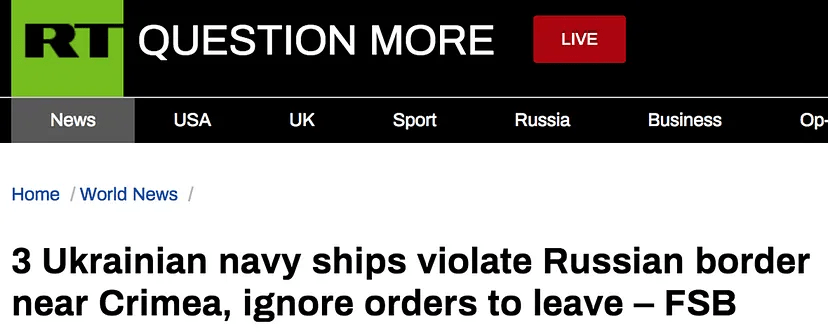#MinskMonitor: Disinformation Tactics Extend to Kerch
The 4Ds of disinformation in pro-Kremlin media following the Russian escalation in the Kerch Strait
#MinskMonitor: Disinformation Tactics Extend to Kerch

BANNER: (Source: Life.ru)
The information environment was fraught with disinformation and distorted narratives, following an incident in which Russia attacked and captured three Ukrainian naval vessels along with their crew.
Using the 4Ds of disinformation framework, @DFRLab analyzed the information published or amplified by pro-Kremlin media as well as the methods used to distort, dismiss, dismay, and distract from the facts of the incident and overall conflict. @DFRLab has previously identified this pattern in other high-profile cases involving Russia and expects more disinformation as the fallout of this incident unfolds.
Distort
The dominant and official narrative from the Kremlin was that the altercation was the direct result of a deliberate provocation by Ukraine. This narrative distorted the underlying facts of the incident with the recurring suggestion that the excursion was to provoke Russia rather than just to move the vessels from one port to another.
This type of dynamic is fairly common in pro-Kremlin media distortions of events that put Russia in a bad light. In the Skripal case, for example, @DFRLab identified a similar phenomenon, when media quoted senior Russian officials’ claims that the poisoning of a former Russian spy living in the United Kingdom by two current Russian spies was a provocative act against Russia.
The offered motivations differed, but the bottom line remained the same — that Ukraine intentionally provoked Russia into using force against its naval vessels.
According to RIA Novosti, the Russian Federal Security Service (FSB) claimed to have “irrefutable evidence of the preparation and conduct of provocations by Kyiv in the Black Sea” (translated from Russian). No such evidence has yet been released.
Kremlin-controlled RT cited Russian Minister of Foreign Affairs Sergei Lavrov suggesting that Ukraine deliberately provoked Russia in hopes of gaining additional support from the United States and Europe.
Sputnik, a Kremlin-funded news service, similarly quoted Russian President Vladimir Putin, who claimed that the incident was a provocation aimed to impose martial law in Ukraine to improve Ukrainian President Petro Poroshenko’s chances of winning the upcoming elections. While martial law was indeed imposed as a result of the confrontation in the territories bordering Russia, the Black Sea, and Moldova’s breakaway region of Transnistria, the elections will take place on March 31 as planned. The FSB has not released any viable evidence so far that the Ukrainian government planned for the altercation.
Dismiss
Russia’s response to the international condemnation of its actions in the Kerch Strait have, thus far, centered around denial of hostile intent, claiming their actions were in line with international law, which Russia argues Ukraine violated.
Kremlin spokesperson, Dmitry Peskov described Ukrainian navy’s actions as “an invasion of foreign military ships into Russia’s territorial waters.” Russian narrative on this rests on two key claims: first, that the Ukrainian navy did not give sufficient advance notice of their intention to pass through the Kerch Strait; and, second, it ignored Russia’s warnings that the Strait was closed.
These claims, however, have no merit under international law. In 2003, Russia and Ukraine signed a treaty defining the Azov Sea and the Kerch Strait as shared territorial waters of the two countries, allowing innocent passage to both Russian and Ukrainian military ships. The treaty did not specify any notification procedures for military vessels. The bilateral document is available on the Kremlin’s own website. Secondly, Russia did not file any international notice about the closure of the Kerch Strait. Ukraine was therefore fully within its rights to send the three vessels through the Kerch Strait on November 25. Lastly, the Crimean territorial waters and exclusive economic zone (EEZ) belong to Ukraine under international law, thus Russian claims of Ukrainian vessels entering their territorial waters are moot.
The Kremlin-crafted falsehood was amplified widely by state-funded media outlets, including Russian-language outlets Tass, RIA Novosti, and TV Zvezda and RT and Sputnik in English.





This falsehood was further amplified by a number of pro-Kremlin actors, including pro-Assad news site Al-Masdar news, Iranian state-funded news outlet Press TV, and Ron Paul’s Liberty Report, a fringe podcast founded by a former U.S. Congressman Ron Paul.
Dismay
In an attempt to intimidate its critics and adversaries, the Russian government made several threatening statements in the aftermath of the incident. In a November 26 press release, the Russian Ministry of Foreign Affairs stated:
“We would like to warn the Ukrainian side that the line pursued by Kiev in coordination with the US and the EU to provoke a conflict with Russia in the waters of the Azov and Black Seas is fraught with serious consequences.”
On the same day, the Russian Mission to the UN tweeted that “Russia will adequately respond to any attempts to infringe on the sovereignty and security” of its territory.
Policy led by #Kiev in coordination with #US and #EU with the aim to provoke a conflict with 🇷🇺 is fraught with the most serious consequences. We will adequately respond to any attempts to infringe on the sovereignty and security of our territory, including #Azov and Black Seas pic.twitter.com/gBSUAlUOO6
— Russia at the United Nations (@RussiaUN) November 26, 2018
Apart from the diplomatic corps, members of Russian Duma made some ominous statements too. Alexander Sherin, the first deputy chairman of the Russian parliament’s lower house Defense Committee, told Riafan, a Russian news outlet known to be an offshoot of the Internet Research Agency, that, in response to the Kerch crisis, Russia should officially recognize Ukraine’s two breakaway “republics,” the Donetsk People’s Republic (DNR) and Luhansk People’s Republic (LPR). The pair are currently only recognized by South Ossetia, which is similarly only partially recognized.

Pro-Kremlin trolls and media outlets were far more outspoken and intimidating. Kremlin-aligned Pravda Report and a pro-Kremlin Twitter account @TeaTramRussia both shared content justifying Russian retaliation, with the former stating that Russia has “every right to destroy Ukrainian warships” and the latter warning Europeans that they will soon “weep with grief” if their “arrogant and stupid rulers think that they can “poke the bear [Russia] all the time.”

Distract
Russian state-owned and pro-Kremlin media outlets sought not only to push disinformation around this specific incident but also promoted a broader narrative of Ukraine as a provocateur while simultaneously distracting from the unfolding story.
On the eve of November 25, RIA Novosti, citing its own correspondents, claimed that Ukraine had begun a massive campaign of firing artillery on civilian areas in Russian-led separatist-held Donetsk city, the so-called DNR.

Local sources did not report activity that resembled anything that would legitimize these claims. Regular low-intensity skirmishes continued on the night of November 25, as they are a regular part of the ongoing stalemate over Crimea, now in its fourth year.
22:52 #Donetsk: …quiet in Donetsk https://t.co/hPNHQ38SVE
— English Luhansk (@loogunda) November 25, 2018
The following day, Russian state-owned news channel Rossiya 24 uploaded a video to YouTube titled “The Donbas fears new war after provocation in the Kerch Strait.” In the video, a reporter inside Donetsk reported on violations of the ceasefire, mostly consisting of 30-millimeter cannon fire. The conclusions drawn from the report appear overblown and distract from the Kerch Strait incident by making it about the Donbas. The Organization for Security and Co-operation in Europe (OSCE) Special Monitoring Mission (SMM) in Ukraine recorded fewer ceasefire violations for November 26 compared to the prior day.

Although this was not directly related to the Kerch incident, it helped delegitimize Ukraine by portraying it as a belligerent actor that consistently acts to provoke Russia. Other outlets reinforced this story by citing RIA Novosti. In particular, Sputnik did its part as RIA’s English-language outlet by spreading the story in the English-language information space, which aimed both to distract from the main issue and to legitimize increased Russian assertiveness against Ukraine. This story did not spread significantly further.
Conclusion
In sum, the Kremlin and its allies are engaging in a familiar distortion campaign, resting on the 4Ds of disinformation — dismissing the allegations of aggression, dismaying Ukraine with threats to recognize the two Russian-backed separatist “republics” in eastern Ukraine, distracting from the core incident by turning the focus to the Donbas, and distorting with accusations of an intentional provocation.
The goal of this campaign is to create confusion, to portray Ukraine as the culprit for both the Kerch Strait incident and the deteriorating security situation in the region, and to exonerate Russia of any responsibility.
This is not the first time the Kremlin has used the four tactics. @DFRLab has documented the Kremlin’s use of the 4Ds of disinformation to deny its involvement in the downing of the Malaysian Airlines flight MH17 over Ukraine, the Skripal poisoning, and the interference in the U.S. Presidential elections in 2016.
Follow along for more in-depth analysis from our #DigitalSherlocks.

